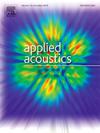Adaptive Vold-Kalman filter FXLMS scheme for harmonic sound quality control
IF 3.4
2区 物理与天体物理
Q1 ACOUSTICS
引用次数: 0
Abstract
Active sound quality control (ASQC) systems for engine noise in an automobile always involve the task of improving the order sound linearity with revolving speed and balancing the proportion of each order’s contribution to the total noise. However, most current ASQC algorithms can not control the sound from the perspective of the order quantitative target. Therefore, a new algorithm, in this paper, is proposed to control the harmonic sound in terms of its order profiles. The algorithm uses the adaptive Vold-Kalman filter (VKF) to track the concerned order of disturbance and schedules the gain factors by calculating the ratio of predefined target amplitudes to the tracked disturbance amplitudes. The gain factors are used to tune the controller output of corresponding orders, which enables the algorithm to equalize single or multiple orders independently. Furthermore, simulated sounds and real engine noises are used to demonstrate the effectiveness. The proposed algorithm can equalize the order(s) sound amplitude to a much narrower range. The results reveal that it is capable of improving the linearity and balancing the proportion of orders and can be further implemented to control the harmonic sound quality.
求助全文
约1分钟内获得全文
求助全文
来源期刊

Applied Acoustics
物理-声学
CiteScore
7.40
自引率
11.80%
发文量
618
审稿时长
7.5 months
期刊介绍:
Since its launch in 1968, Applied Acoustics has been publishing high quality research papers providing state-of-the-art coverage of research findings for engineers and scientists involved in applications of acoustics in the widest sense.
Applied Acoustics looks not only at recent developments in the understanding of acoustics but also at ways of exploiting that understanding. The Journal aims to encourage the exchange of practical experience through publication and in so doing creates a fund of technological information that can be used for solving related problems. The presentation of information in graphical or tabular form is especially encouraged. If a report of a mathematical development is a necessary part of a paper it is important to ensure that it is there only as an integral part of a practical solution to a problem and is supported by data. Applied Acoustics encourages the exchange of practical experience in the following ways: • Complete Papers • Short Technical Notes • Review Articles; and thereby provides a wealth of technological information that can be used to solve related problems.
Manuscripts that address all fields of applications of acoustics ranging from medicine and NDT to the environment and buildings are welcome.
 求助内容:
求助内容: 应助结果提醒方式:
应助结果提醒方式:


